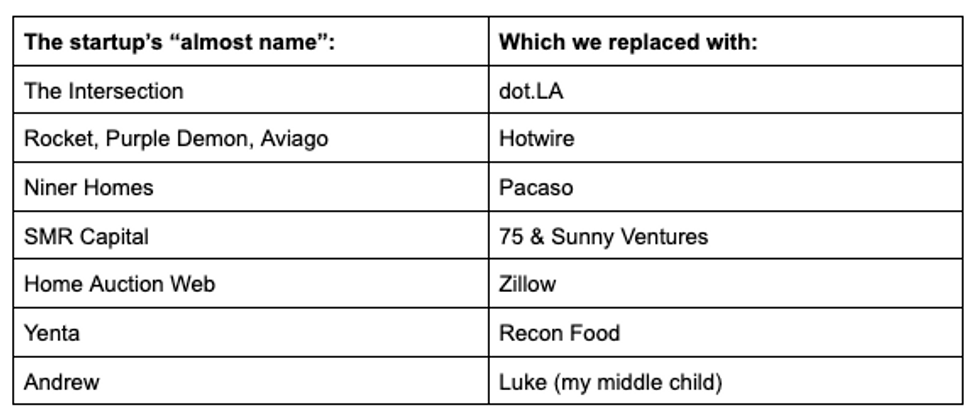How to Startup Part 2: Naming Your Business
Spencer Rascoff serves as executive chairman of dot.LA. He is an entrepreneur and company leader who co-founded Zillow, Hotwire, dot.LA, Pacaso and Supernova, and who served as Zillow's CEO for a decade. During Spencer's time as CEO, Zillow won dozens of "best places to work" awards as it grew to over 4,500 employees, $3 billion in revenue, and $10 billion in market capitalization. Prior to Zillow, Spencer co-founded and was VP Corporate Development of Hotwire, which was sold to Expedia for $685 million in 2003. Through his startup studio and venture capital firm, 75 & Sunny, Spencer is an active angel investor in over 100 companies and is incubating several more.

As a co-founder of nine startups and an investor in dozens more, I have helped name many companies. (I am also a parent of three children and two dogs, all of which I have helped name as well – it’s amazing how similar the process of naming a child is to naming a company.) Naming is hard and is a passionate subject among founders which prompts lots of debate.
When we named Pacaso, it took a couple of months. Pacaso was not the first name we chose – in fact, we hadn’t even dreamed up the name when we went through our first round of finalists. Our first name was Niner Homes, a reference to the vitality of the Gold Rush era. We used Niner Homes in our early marketing materials as we built the first version of the beta product, but we ultimately decided to change it to Pacaso.
We got the inspiration for the name Pacaso from the artist Pablo Picasso, but put our own spin on it. Pacaso fills all of my naming criteria (see below), and it’s been well-received by the many Pacaso stakeholders including our employees and Pacaso homeowners.
If you are at the stage where it’s time to name your new venture, here are a few tips to keep in mind as you start to vet potential name options.
What Makes A Good Name?
A good name should be the following things:
* Memorable. Pick something that’s easy to say and remember. A brand name doesn’t have much value if no one can remember it.
* Spellable. Your name should be easy enough to type into the search bar correctly. If it’s overly complex and includes tricky abbreviations or numbers, this could be a problem. (One of my startups was named 6tudio but was pronounced “Studio” - hard to spell, even harder to pronounce. They changed their name to Invisible Universe – much better.)
* Unique letters and sounds help: Try to create a name that’s high in Scrabble points - X, Z, K, P, Y are all good letters.
* Ownable. This may be obvious, but make sure the name is available and trademarkable. At Hotwire, we almost launched with the name Rocket but switched it at the last minute because Rocket.com was not trademarkable.
You should also consider if the name is verb-able or noun-able. Many brands spend a fortune on marketing trying to become a household name, but a brand is really successful when its name becomes synonymous with the product or service it provides. For example, we probably all “Google” something on a daily basis - to Google has become a transitive verb. To Zillow means to look something up on Zillow. An Airbnb means a vacation rental property. And hopefully, someday a Pacaso will be widely known as a co-owned second home. My first startup, Hotwire, never quite got to household brand name status, but we always hoped that “to Hotwire” something would mean to buy a travel product online at a great price. Maybe someday.
Different Types of Names
To help get those gears turning, let’s look at some examples of different types of names. There are a few different categories:
* Real-world, descriptive, and in-category like Whitepages, Bankrate, CreditCards.com, and Apartments.com. These names give you a really great idea of what the company and/or service is but their generic nature makes it unlikely that consumers will ever fall deeply in love with these brands.
* Real-world, not descriptive, and not in-category like Stripe, Plaid, Pipe, Bolt, and Gopuff. These names don’t tell you much about what the company is providing.
* Made-up words like Yahoo, eBay, Bing, and Hulu. These names can create unique new worlds.
* Reference the category without an explanation like Instacart, Netflix, SpaceX, Boosted, LendingTree, and Coinbase. These names give you an idea of what type of product or service is being provided without an explanation.
* Reference with an explanation like Zillow (“zillions of pillows”), dotLA (like “dot-com” but for LA), Pacaso (“combine different things to make something luxurious and beautiful”), and Recon Food (“reconnect over a love of food”).
These names give you an idea of what type of product or service is being provided when given an explanation. As you can probably tell, I prefer names in this last category because they are memorable, have brand equity, and don’t constrain the business with specificity.
Prototype and Pivot
It’s common that in the early stages of a startup, the product or features will change to serve early adopters. When the idea of your product or service morphs, your name might have to change too.
Your business name will be with you for a long time, so it’s important to carefully consider your choice before you move ahead at full speed. A good name will reflect your business’s identity and goals, help market yourself, and keep you out of legal trouble.
Once you have solidified a name, now it’s time to pitch to investors. Check back here in a few weeks for my advice on how to do just that. In the meantime, take a look at some of my examples below to see what names made the final cut:
- When to Accept Startup Equity — and Why - dot.LA ›
- How to Establish Core Values at a Startup - dot.LA ›
- How To Brainstorm a Good Startup Idea. - dot.LA ›
- How to Pitch Your Startup - dot.LA ›
- How Find Product-Market Fit for Your Startup - dot.LA ›
- How To Build And Scale A Successful Company - dot.LA ›
Spencer Rascoff serves as executive chairman of dot.LA. He is an entrepreneur and company leader who co-founded Zillow, Hotwire, dot.LA, Pacaso and Supernova, and who served as Zillow's CEO for a decade. During Spencer's time as CEO, Zillow won dozens of "best places to work" awards as it grew to over 4,500 employees, $3 billion in revenue, and $10 billion in market capitalization. Prior to Zillow, Spencer co-founded and was VP Corporate Development of Hotwire, which was sold to Expedia for $685 million in 2003. Through his startup studio and venture capital firm, 75 & Sunny, Spencer is an active angel investor in over 100 companies and is incubating several more.




 Image Source: Skyryse
Image Source: Skyryse
 Image Source: Northwood Space
Image Source: Northwood Space